MBA application process of top business schools is becoming more complex every year due to an ever-increasing number of applications. All business schools consider different evaluation factors while assessing applications but some factors are more important than others. All aspirants have numerous questions about the MBA requirements and application process, work experience requirements as well as MBA prerequisites, the scope of MBA without work experience and the eligibility criteria for a successful MBA Application. In this article, we’ve tried to answer some of these questions along with providing “5 steps to creating a strong MBA application for top business schools“. The table below gives you an idea of the relative importance of different factors that B-schools consider during the MBA application process.
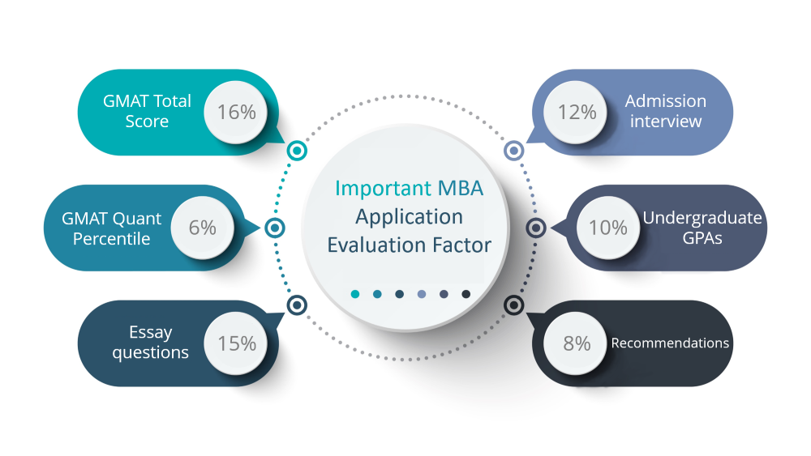
MBA Application Process – Evaluation Factors, Importance, and Weightages
| MBA Application Factors | Weightage (%) |
| GMAT Total Score | 16 |
| GMAT Quant Percentile | 6 |
| Essay questions | 15 |
| Admission interview | 12 |
| Undergraduate GPAs | 10 |
| Recommendations | 8 |
| Employers’ brand | 7 |
| Undergraduate college | 6 |
| Extracurriculars | 6 |
| Length of Work Experience | 5 |
| Industry of employment | 3 |
| International experience | 3 |
| Undergraduate Major | 2 |
| Languages | 1 |
The above data is based on a survey conducted by Poets & Quants to find out how business schools break up the application. This also provides the information as to what is the relative importance assigned to each section. As you can see, with a high GMAT score, you can make a stronger case for your application. The above list is not an exhaustive list, as business schools sometimes consider more factors such as Gender, Nationality or program fit. They consider these factors to create a more diverse classroom.
Here is a brief outline of the aspects covered in this article on MBA Application Process –
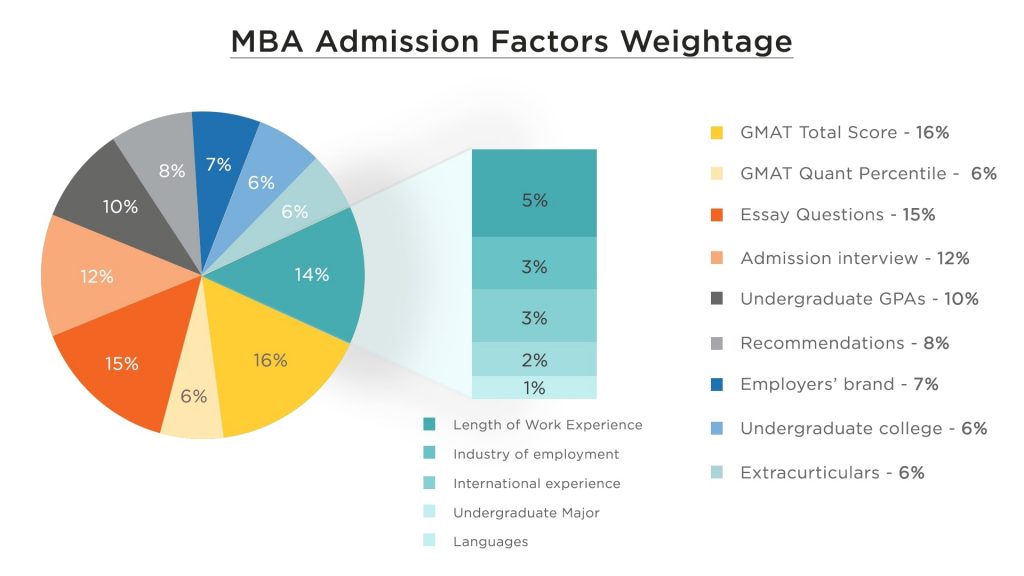
- 5 steps to creating a strong MBA Application
- Analyzing MBA Application – MBA Application Evaluation Factors
- Qualitative vs Quantitative | Classification 1 | MBA Application Process
- Changeable vs Unchangeable | Classification 2
- Easily comparable vs. Not | Classification 3
- Documented vs Undocumented | Classification 4
- Start your MBA application process early
5 steps to creating a strong MBA application for top business schools | MBA Application Tips
- MBA Application Tip 1: Prepare and Register for GMAT
- MBA Application Tip 2: Introspect to make a killer essay for your application
- MBA Application Tip 3: Strengthen your resume
- MBA Application Tip 4: Connect with recommenders
- MBA Application Tip 5: Choose business schools you want to apply
MBA Application Tip 1 – Prepare and Register for GMAT
Your GMAT accounts for 22% weight-age in your application. Most students require 3 months of preparation time to achieve a 700+ score.
Make sure to target a score which is 20+ more than the average GMAT score of your target B-school’s incoming batch.
MBA Application Tip 2 – Introspect to make a killer essay for your Application
What makes you stand out from other applicants? How have you impacted the lives of people around you? Do you possess leadership qualities?
Start with these questions. Their answers will help you share your story in your MBA Application and convince B-Schools that you are a good fit for their program. It is the second most important factor which has a 15% weight-age – Read more to understand the importance of essays in B-School applications.
MBA Application Tip 3 – Strengthen your resume
Your work experience is exceptional but adding extracurricular work can make your resume impeccable.
Take up some leadership work which would ultimately positively impact your peers. You feel social work is your calling – join an NGO and help build weak communities. In short, analyze the gaps in your resume and work on them.
MBA Application Tip 4 – Connect with recommenders
Connect with potential recommenders well in advance of your application deadline. An ideal recommender is someone who knows you well enough to provide a strong recommendation.
MBA Application Tip 5 – Choose business schools you want to apply
Select schools based on your targeted GMAT score.
Finalize 5-8 schools and create a spreadsheet of those schools with their respective application deadlines and rank each of them. Their last incoming batch’s average GMAT score should be your starting point.
Confused about how to select the “right” business schools to apply to? Follow the 6-step process to choose the right b-school in this article
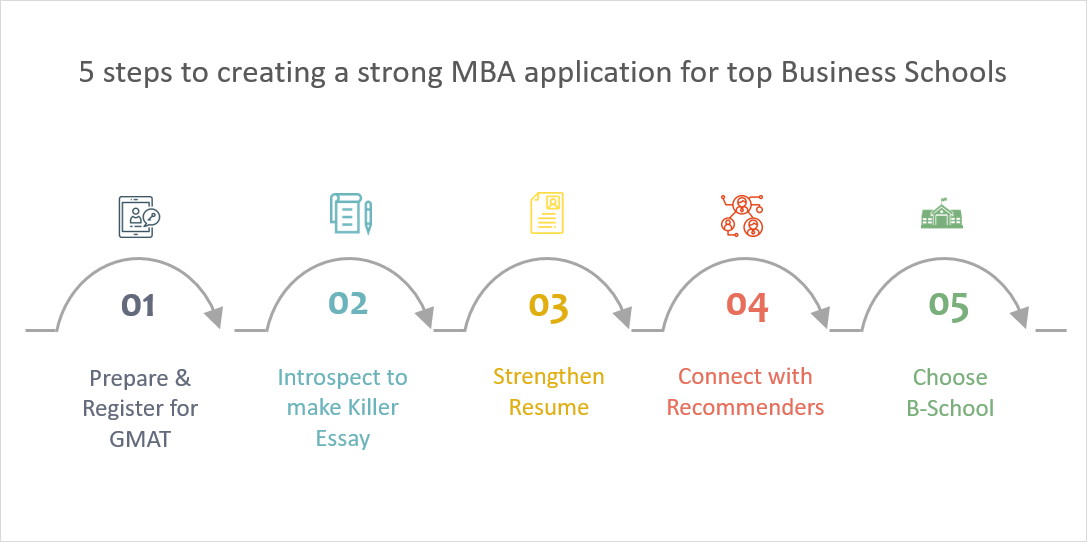
What is a good GMAT score for admission to top business schools?
Analyzing MBA Application for admission to top Business Schools
We have classified all the factors we mentioned earlier into four categories. This will help you assess your application better and highlight your improvement areas.
- Qualitative vs Quantitative
- Changeable vs Unchangeable
- Easily comparable vs Not
- Documented vs Undocumented
Qualitative vs Quantitative | Classification 1 | MBA Application Process
| Qualitative | Quantitative |
| Essay questions | GMAT Total Score |
| Admission interviews | GMAT Quant percentile |
| Recommenders | Undergraduate GPAs |
| Employers’ brand | Length of Work Experience |
| Undergraduate college | |
| Extracurriculars | |
| Industry of employment | |
| International experience | |
| Undergraduate Major | |
| Languages | |
| Gender | |
| Nationality | |
| Program fit |
Quantitative factors show your intellectual aptitude whereas, Qualitative factors essentially give top business schools an idea about your interpersonal skills, personality, and character.
GMAT is an important factor for interview invites and post-interview acceptance rates
Below is the data compiled by GmatClub of M7 elite schools (Harvard, Stanford, Wharton, Kellogg, Booth, Columbia, and MIT Sloan) comparing acceptance rates with GMAT scores. The sample size is 10,029 applicants. You can see that Interview invites and post-interview acceptance rates increase as the GMAT score increases.
The GMAT score will go a long way in adding value to your career. Learn about the importance of GMAT and the top 3 reasons on why you should take the GMAT.
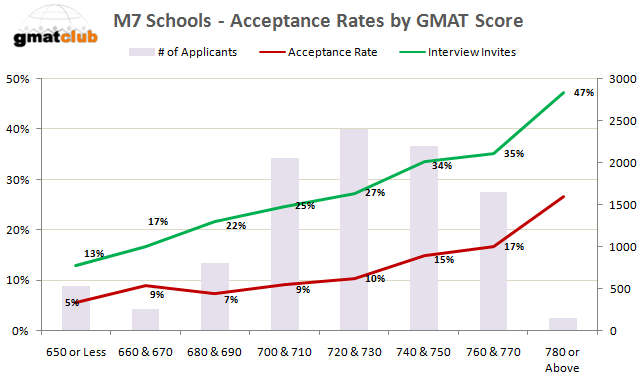
M7 Business Schools – Post Interview Acceptance Rates by GMAT Score
| Interview Acceptance Rates (%) | 650 or less | 660-670 | 680-690 | 700-710 | 720-730 | 740-750 | 760-770 | 780 or above |
| 42 | 52 | 33 | 36 | 38 | 44 | 47 | 57 |
Changeable vs. Unchangeable Evaluation Factors | MBA Application
In the MBA application process, there might be some parameters that are not under your control now (such as GPA/Employer’s brand etc), but a whopping 56% is still within your immediate control such as GMAT score, Essays, Interview, and Recommenders. You should focus on putting your best foot forward as far as these fronts are concerned.
GMAT preparation is completely under your control. The interview is dynamic in nature. You can guide the interview in the direction you want if you’re smart enough to give pointers/hints about the topics you want to talk about. Even though what experiences you share in your essay will not change but proper articulation and presentation can take you close to the finish line. Same goes for your letters of recommendation. Proper articulation is the key.
Easily comparable vs. Not | Classification 3 | MBA Application Process
Quantitative factors are always easier to compare. For example, between two applicants, if one has a 3.9 GPA with a 760 GMAT score and other has a 3.2 GPA with a 680 GMAT score, it becomes easier for the B-school to compare if they have the same educational background.
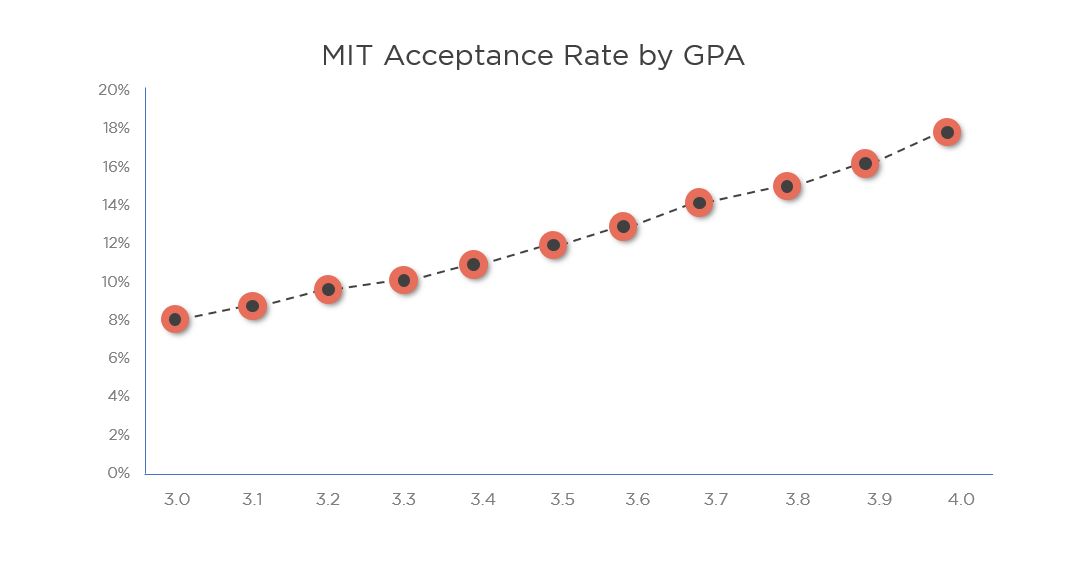
GPA is also critical for admission into top business schools. For the MIT-Sloan School of Management, the average GPA is very high at 3.6. For each 0.10 change in GPA, the acceptance rate changes by roughly 1%.
Now lets the first example. What if the first applicant has a 3.9 GPA and 680 in GMAT and the other applicant has a 3.2 GPA and 760 in GMAT. Now the situation becomes difficult to compare. In this situation, the business school must rely on other factors, which might or might not be in your control when you apply. Therefore, it’s essential to maintain a good score in the quantitative factors.
The role of qualitative factors become prominent when quantitative factors become difficult to compare. For example, your undergraduate major can be easily judged, provided the applied specialization in MBA is relatable. An undergraduate major in Operations research can easily be found suitable for Operations Management by a B-School as compared to an undergraduate major in fine arts.
Documented vs. Undocumented | Classification 4 | MBA Application Process
Documented parameter means that an organization/authority has attested to the parameter you claimed in your application. GMAT score, Undergraduate GPA, length of work experience, essay questions and interviews are some important documented parameters. You can understand the value of documented parameters by looking at the weight-age assigned to each one of them.
The GMAT exam alone accounts for 22% weight-age. (16% of your total GMAT score plus 6% of your quantitative section score). As these top business schools look for applicants who are comfortable crunching numbers, your quantitative section score becomes even more important. But remember, B-schools prefer a balanced score in GMAT. Your GMAT score, which is attested by the GMAC, is one evaluation that proves your potential for managing the rigorous MBA program. Therefore, it is important to understand that B-schools will always first look at the documented parameters.
Get started with your GMAT Prep. Sign up here for a free trial to get access to 400+ practice questions and 7 free webinars by GMAT Club’s top rated instructors.
Start your MBA application process early

Top Business Schools demand impeccable applications, so you require time, planning, and introspection to create a strong application. Therefore, start with your application process 5-6 months before the deadline. Work consistently on your application. Review your application against the factors that we have explained and you’ll be able to assemble the most competitive MBA application possible.
References:
Hope you have a better understanding of the relative importance of the evaluation factors in MBA Application.
Begin your GMAT preparation with the only prep company that has delivered more 700+ scores than any other GMAT club partner. Achieve GMAT 740+ with our AI driven tools that you personilzed feedback at every step of your GMAT journey. Take our free trial today!














